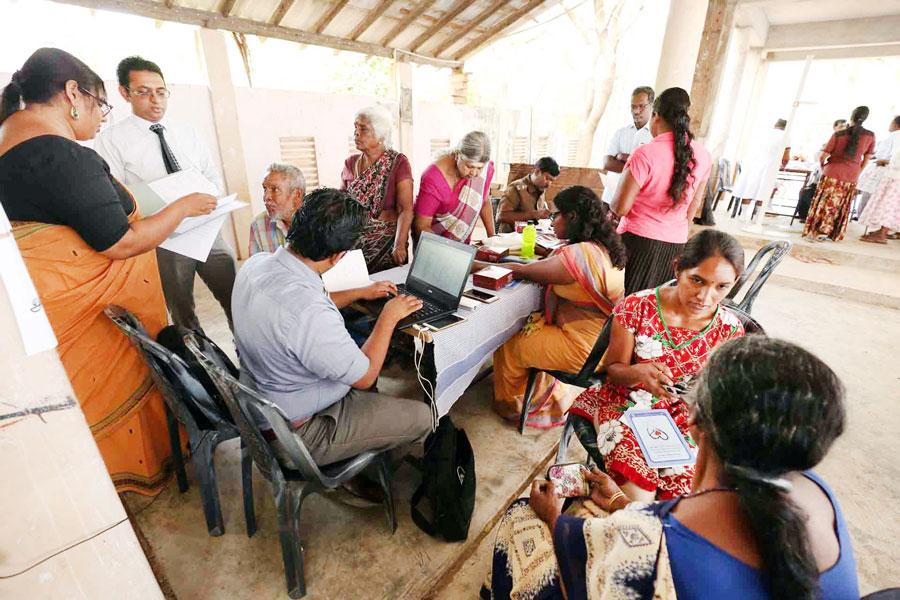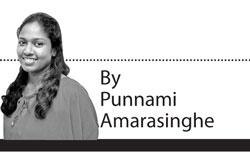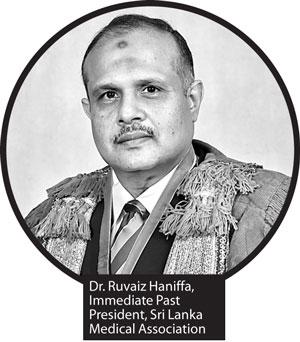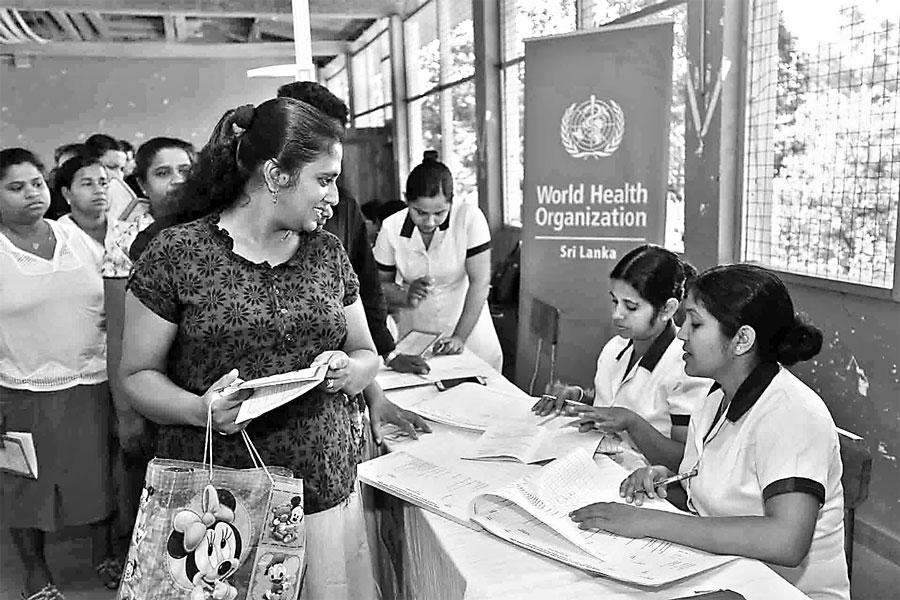Reply To:
Name - Reply Comment
Last Updated : 2024-04-23 22:35:00

Jaffna screening
 Close your eyes and travel back to your village when you were ten years old. Can you see how much change the years have wrought since your younger days? It’s amazing how time can affect the society, both attitude and material -wise, isn’t it?
Close your eyes and travel back to your village when you were ten years old. Can you see how much change the years have wrought since your younger days? It’s amazing how time can affect the society, both attitude and material -wise, isn’t it?
World health is similarly affected by time. It is a dynamic entity, changing with society, with the advancement of healthcare facilities and lifestyles. We have passed many centuries where diseases like Malaria, Tuberculosis and Smallpox plagued the world, massacring millions along the process.
Thankfully, with the aid of modern medicine, we have overcome a large portion of the burden of infectious diseases. But with the changes of lifestyle and environment, non-communicable diseases (NCDs) have taken the crown once occupied by the infectious diseases as the principal killer.
Therefore, the areas that need improvement when it comes to healthcare too are not consistent, just as the disease patterns, needing more and more focus on these issues of the millennium dawned.
GLOBAL SYNDEMIC
While some diseases are specific to some areas in the world; dengue, for tropical countries, for instance, certain problems are universal to almost every country in this day and age. According to a recent report by The Lancet, one of the oldest and most accepted medical journals in the world, the term ‘global syndemic’ represents a collection of such problems faced worldwide due to human activities.
These problems – comprising of the global issues of climate change, obesity and undernutrition – interact with each other to form complex links thus affecting global health. One of the major ways humankind affect climate change is through the production of greenhouse gases. Industrial level agriculture and food production, which keep the major fast food chains around the world running, cause emission of massive amounts of gases accounting to roughly 20% of manmade greenhouse gas production, while promoting unhealthy food patterns which cause obesity in the population. With fast food joints popping up like mushrooms in each corner with cheaper and cheaper options for the consumer, the vicious circle is unlikely to discontinue anytime soon.
A series of events marking the World Health Day is planned to be held on April 7 from 7.00 a.m. onwards at the Independence Arcade

Burning of mineral oils through improvements of transportation in the developing world is another massive source of greenhouse gas emission. While vehicles have certainly done their part in improving human efficiency, it is undeniable that it is a major issue causing human obesity. Think of all the times you opted to travel by a vehicle to a walkable distance in order to save time or for your comfort.
While it seems that undernutrition and obesity are opposite ends of a spectrum, the two are more interconnected, science has found. Obese people are more susceptible to undernutrition and undernutrition in younger age is tied with obesity at declining years according to research.
SRI LANKAN SITUATION
Sri Lanka is the proud owner of a free healthcare system which runs back to the 1950s. Also, the achievements in the field of health as a country put Sri Lanka on an equal footing with many developed countries. Our low rates of maternal and infant death with excellent vaccination coverage, elimination of Malaria, Lymphatic Filariasis and Neonatal Tetanus are some examples.
But this does not mean there do not exist many gaps to be bridged when it comes to our healthcare. For instance, even though our healthcare system is supposedly (completely) free, there are many out-of-pocket expenditures that frequently have to be endured by the poor patient, like the cost of investigations that are not available in government hospitals and cost of drugs which are out of stock in hospitals. In addition, the large burden of patients in central hospitals means waste of productive time and money in obtaining healthcare.
The demographic survey of 2016 found that 17% of Sri Lankan children under five years have low height for age, meaning they suffer from chronic malnutrition. Furthermore, 15% of children under five years have low weight for height, which translates to acute malnutrition.
Demographic survey of 2016 found that 17% of Sri Lankan children under five years have low height for age, meaning they suffer from chronic malnutrition
With the burden of infectious diseases lowered with improved healthcare, non-communicable diseases have taken centre-stage as the main killer; Ischaemic heart diseases, diabetes mellitus and strokes being the strongest amongst them. Annual health bulletin statistics show some 25% of Sri Lankan men and 34% of women are overweight, putting them at risk of many non-communicable diseases like ischaemic heart diseases and diabetes. It is estimated that 21% of the diagnosed diabetics are not on treatment, according to Dr. Ruvaiz Haniffa, immediate past president of the Sri Lanka Medical Association (SLMA).
With the life expectancy of a person at birth increasing steadily with the improvement of healthcare, increasing percentage of above sixty populations has become another health challenge for the country. This percentage, which was just 9% of the total population in 2001, rose to 12.5% by 2011 and is expected to reach 30% by 2030. This increasing population brings along a specific set of health challenges like elderly care, diabetes, hypertension, ischaemic heart diseases and end of life care.
Although as previously mentioned, we have achieved high status in healthcare, the numbers are found to be unequally distributed amongst the society. For instance, it has been found that undernutrition of children under five years are more prevalent among the estate sector, children with mothers who lack primary education as well as in children from low-income families.

LACK OF DISEASES Vs HEALTH
Does the absence of diseases in a person mean he or she is healthy? Many would answer ‘yes.’ But according to the World Health Organisation’s definition of ‘health,’ which states that it ‘is a state of complete physical, mental and social well-being, and not merely the absence of disease or infirmity,’ absence of disease is simply a portion of being ‘healthy.’
“Human health has come to be viewed in terms of the mere absence of disease or the successful or unsuccessful treatment/control of it. Consequently, disease care has come to be synonymous with healthcare. This misinterpretation of the definition of health is one of the fundamental causes for healthcare shifting to one of disease care,” says Dr. Haniffa. This has resulted in people seeking healthcare only when they are ‘sick,’ thus paving the way for diseases that manifest over a long period of time due to unhealthy patterns of living for years, like diabetes mellitus, hypertension and heart diseases, to eventually engulf the humankind.
Hence, it’s high time for the healthcare system to shift focus from ‘disease’ to individuals, explains the doctor, further elaborating that the most efficient and cost-effective way of doing this is to make universal healthcare available through a primary care approach.
NEED TO IMPROVE PRIMARY HEALTHCARE
This is most easily achieved by increasing primary healthcare services, since it’s the grassroots level of health facility which acts as the first contact in majority of healthcare seekers, according to Dr. Haniffa. With that goal in mind, the World Bank board has recently approved a Primary healthcare System Strengthening Project (PSSP), a loan amounting to USD 200 million, to the Sri Lankan Government. Building of capacities of medical officers working in primary care settings is a main emphasis of PSSP. As an initial step in the direction, the Health Ministry and SLMA will be partnering with the College of General Practitioners of Sri Lanka to train a group of 100 medical officers in the Kalutara District using the distance education format through the DigitalAcademy setup by the Health Ministry.
Going a step further, the project also plans on improving Universal Health Coverage (UHC) — ensuring people have access to needed promotive, preventive, curative, rehabilitative and palliative health services, of sufficient quality to be effective. At the same time, it will ensure people do not suffer financial constraints when paying for these services by increasing the utilization and quality of necessary primary healthcare services as well as ensuring the availability of essential medication, according to SLMA.
ROLE OF SLMA IN ACHIEVING THE TARGET OF UNIVERSAL HEALTH
SLMA, as the primary organisation which brings together healthcare specialists across various fields in Sri Lanka – partnering with the Health Ministry and World Health Organisation – is working tirelessly to achieve the goal of making health accessible to all citizens.
One such major campaign aimed at winning the support of policymakers in achieving universal health in Sri Lanka through educating them on the current major health issues faced by the country ‘Health for All in Sri Lanka: Role of Parliamentarians in achieving Universal Health Coverage’ was held last year with the participation of more than 50 MPs.
As the most recent programme of a series of activities on making the major stakeholders more aware of the current problems in the local healthcare system, SLMA is collaborating with WHO to organise a moderated panel discussion to highlight the concept of UHC based on experiences of our citizens. The panel discussion has been titled ‘Answering Voices from the Field.’ The ideas, concerns and expectation emanating from the voice of the people will be answered by an invited panel comprising of Faizal Cassim, State Minister of Health, Nutrition and Indigenous Medicine, Dr. Harsha de Silva, Minister of Economic Reforms and Public Distribution, Ajith Mannapperuma, State Minster of Mahaweli Development and Environment, Dr. Anil Jasighe, Health Services Director-General, Mrs. Renuka Peiris, Director of Health and Nutrition, Ministry of Education and Prof. Anula Wijesundara, SLMA President. The session will be moderated by Dr. Ruvaiz Haniffa, immediate past president of SLMA.
The voice of the people was captured by a team comprising experts from the WHO Sri Lanka office, relevant provincial departments of health services and the College of Community Physicians of Sri Lanka. The aim of the exercise was to meet the people and hear their ideas, concerns and expectations as to how they think the shape and form of healthcare services should look like both in the government and private sectors. The exercise also took the message Universal Healthcare throughout Sri Lanka. The voice of the people was captured and would be discussed under the four themes listed below;
1. Healthcare access
2. Out Of Pocket Expenses (OOPE) on health
3. People’s satisfaction of health services in terms of quality and safety
4. People’s experience of promotive and preventive healthcare
WORLD HEALTH DAY 2019
World Health Day, which is celebrated on April 7 every year to mark WHO’s founding, is made an opportunity to create awareness on a subject of major importance to global health. This year’s theme, ‘Universal Health Coverage; Everyone, Everywhere,’ is WHO’s number one goal. Key to achieving this goal is by ensuring everyone can obtain the care they need, when they need it, right in the heart of the community, according to WHO.
A series of events marking the World Health Day is planned to be held on April 7 from 7.00 a.m. onwards at the Independence Arcade. The launching of an Essential Care Service Package with the WHO Sri Lanka branch taking a leading role in the process will be another key event on this year’s World Health Day celebrations. “This includes definition and design of an essential healthcare package to be available at all primary care institutions. This set of preventive, promotive, curative services comprising of rehabilitation and palliative services includes the relevant medical goods, medicines and technologies, that every person should have access to, regardless of their ability to pay for them,” comments the WHO spokesperson for Sri Lanka.
Having the honour of hosting the 70th World Health Day,which was celebrated last year, was an important milestone in the history of Sri Lankan health. “From engaging and educating Parliamentarians on emerging health challenges and issues to organising UHC/PHC conference with inputs from all levels of healthcare institutions and providers and learning from international experience, the journey towards progressive realisation and evolution of health policy, programme, service delivery and sustainable financing has been noteworthy,” said WHO, further commenting on the success the country has achieved in the year that followed.
NO EASY ROADS
“Health for everyone, everywhere requires that individuals and communities have access to quality health services closer to where they live and without financial hardship; skilled health workers who can provide quality, people-centred care; and policymakers committed to investing in primary healthcare. Sri Lanka is committed to all these and the time has come for all of us to work synergistically to ensure the health and well-being of all in Sri Lanka leaving no one behind,” are the words of Dr. Razia Pendse, WHO representative of Sri Lanka.
But everything is not as easy as it seems. As Dr. Ravindra Rannan Eliya, Executive Director of the Institute of Health, said in his speech at the session ‘Role of Parliamentarians in achieving Universal Health Coverage,’ there are no easy answers to the problems of the healthcare sector today. The path to achieving better facilities and universal healthcare is bound to be a long and tedious one. But, if all of us do our part to bring forth a healthy earth for a better tomorrow through sustainable living, we are bound to get there sooner, rather than later.

Add comment
Comments will be edited (grammar, spelling and slang) and authorized at the discretion of Daily Mirror online. The website also has the right not to publish selected comments.
Reply To:
Name - Reply Comment
On March 26, a couple arriving from Thailand was arrested with 88 live animal
According to villagers from Naula-Moragolla out of 105 families 80 can afford
Is the situation in Sri Lanka so grim that locals harbour hope that they coul
A recent post on social media revealed that three purple-faced langurs near t